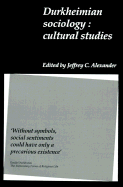Book contents
- Frontmatter
- Contents
- List of contributors
- Acknowledgements
- Introduction: Durkheimian sociology and cultural studies today
- Social change and sacralization
- Micro and macro in symbolic context
- Ritualization and public life
- 7 Articulating consensus: the ritual and rhetoric of media events
- 8 Culture and political crisis: “Watergate” and Durkheimian sociology
- Index
8 - Culture and political crisis: “Watergate” and Durkheimian sociology
Published online by Cambridge University Press: 05 July 2011
- Frontmatter
- Contents
- List of contributors
- Acknowledgements
- Introduction: Durkheimian sociology and cultural studies today
- Social change and sacralization
- Micro and macro in symbolic context
- Ritualization and public life
- 7 Articulating consensus: the ritual and rhetoric of media events
- 8 Culture and political crisis: “Watergate” and Durkheimian sociology
- Index
Summary
Durkheim's legacy has been appropriated by generations of social scientists in strikingly different ways. Each appropriation depends on a reading of Durkheim's work, of its critical phases, its internal crises and resolutions, and its culminating achievements. Such readings themselves depend upon prior theoretical understandings, for it is impossible to trace a textual development without seeing this part within some already glimpsed whole. The texts, however, have constituted an independent encounter in their own right, and new interpretations of Durkheim have given crucial impetus to the development of new theoretical developments in turn.
Almost every imaginable kind of sociology has been so inspired, for it is possible to see in Durkheim's development sharply contrasting theoretical models and presuppositions. Ecological determinism, functional differentiation, demographic expansion, administrative punishment and legal control, even the distribution of property – the study of each has been taken as sociology's decisive task in light of Durkheim's early work. From the middle and later work have emerged other themes. The centrality of moral and emotional integration is undoubtedly the most pervasive legacy, but anthropologists have also taken from this work a functional analysis of religion and ritual and a structural analysis of symbol and myth. None of these inherited exemplars, however, takes fully into consideration the actual trajectory of Durkheim's later and most sophisticated sociological understanding. Given Durkheim's classical stature, this failure is extraordinary, the possibility of remedying it equally so.
- Type
- Chapter
- Information
- Durkheimian SociologyCultural Studies, pp. 187 - 224Publisher: Cambridge University PressPrint publication year: 1988
- 69
- Cited by

